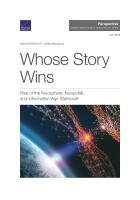by David Ronfeldt, John Arquilla
 In this Perspective, the authors urge strategists to consider a new concept for adapting U.S. grand strategy to the information age—noopolitik, which favors the use of "soft power"—as a successor to realpolitik, with its emphasis on "hard power." The authors illuminate how U.S. adversaries are already deploying dark forms of noopolitik—e.g., weaponized narratives, strategic deception, epistemic attacks. The authors propose new ways to fight back and discuss how the future of noopolitik might depend on what happens to the global commons—i.e., the parts of the Earth and space that fall outside national jurisdictions and to which all nations are supposed to have access.
In this Perspective, the authors urge strategists to consider a new concept for adapting U.S. grand strategy to the information age—noopolitik, which favors the use of "soft power"—as a successor to realpolitik, with its emphasis on "hard power." The authors illuminate how U.S. adversaries are already deploying dark forms of noopolitik—e.g., weaponized narratives, strategic deception, epistemic attacks. The authors propose new ways to fight back and discuss how the future of noopolitik might depend on what happens to the global commons—i.e., the parts of the Earth and space that fall outside national jurisdictions and to which all nations are supposed to have access.
The authors expand on many of the ideas they first proposed in a 1999 RAND Corporation report titled The Emergence of Noopolitik: Toward an American Information Strategy, in which they describe the emergence of a new globe-circling realm: the noosphere. The authors explain that Earth first developed a geosphere, a geological mantle, and then a biosphere, consisting of plant and animal life. Third to develop will be the noosphere, a global "thinking circuit" and "realm of the mind"—a collective form of intelligence enabled by the digital information revolution. As the noosphere expands, it will profoundly affect statecraft; the conditions favoring traditional realpolitik strategies will erode, and the prospects for noopolitik strategies will grow. Thus, the decisive factor in today's and tomorrow's wars of ideas is bound to be "whose story wins"—the essence of noopolitik. To improve prospects for the noosphere and noopolitik, U.S. policy and strategy should, among other initiatives, treat the global commons as a pivotal issue area, uphold "guarded openness" as a guiding principle, and institute a requirement for periodic reviews of America's "information posture."
No comments:
Post a Comment